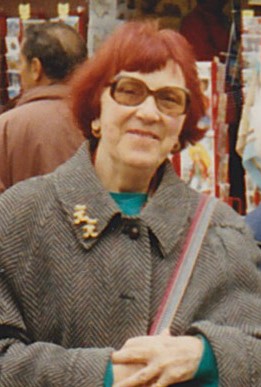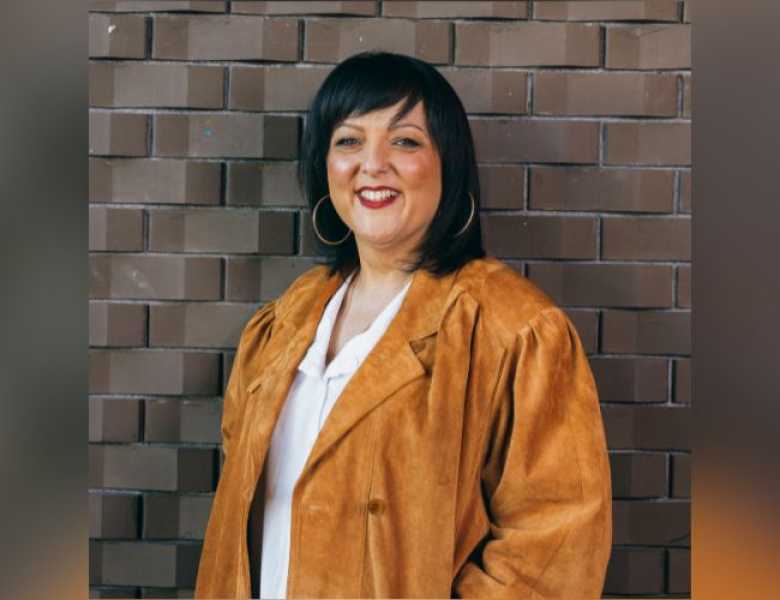Box Office
- CALL: 020 7922 2922
- EMAIL: boxoffice@youngvic.org
Visit us
Young Vic, 66 The Cut, Waterloo
London , SE1 8LZ
Newsletter Sign up
Sign Up Today Vi Marriott in 1996
Vi Marriott in 1996We are sad to record the death at 97 of Vi Marriott, who became a legend in the annals of the history of The Young Vic, being inextricably bound in with its early years, serving as right hand to founder, Frank Dunlop for over 20 years from the theatre’s inception in 1970.
She had begun her theatre career as assistant to Laurence Evans, the General Manager of the Old Vic during the famous triumvirate of Laurence Olivier, Ralph Richardson and John Burrell, then housed at the New Theatre (now the Noël Coward) in St Martin’s Lane following damage during the Blitz. “As I walked through the stage door, I thought it was the Holy Grail, and to be working alongside the charismatic Olivier, what could be better? Larry was ravishingly handsome.” she added, “both men and women fell for him. He had the most beautiful bone structure, with piercing blue eyes and wavy, dark hair.”
Following a controversial decision, the triumvirate was brought to an end, but Vi stayed on, moving back to the renovated Old Vic in the Waterloo Road to work with the new Director Hugh Hunt. She continued working there until 1955, when Hunt was appointed to set up the Elizabethan Theatre Trust, in Sydney, Australia’s first National Theatre. She followed Hunt out there working down under for five very happy years, falling in love with the country. It was an exhilarating time working with Australia’s burgeoning theatre talent, such as a young Peter Finch, the brilliant artist and set designer Sydney Nolan, and an exciting new playwright by the name of Ray Lawler, whose first play The Summer of the Seventeenth Doll was a runaway success.
She returned to England to look after her father who was then very ill, but soon got a job with a PR company called Talent Artists, when she met one of their clients, the Director Frank Dunlop. At that time he was the administrative director of the new National Theatre, then housed at The Old Vic. Olivier had asked Dunlop to set up a theatre for young people and Frank’s vision was to create a new kind of theatre, producing quality plays for a young audience, with high-quality plays but at reasonable prices. In 1970 he invited Vi to join him in the Cut at what was anticipated to be only a temporary building in an old butcher’s shop. It was to be called The Young Vic.
“It was only meant to last five years,” she remarked later. “It was just plain brick and concrete; no elaborate furnishings or carpet: The shows were very simple, with no scenery, and costumes often bought at places like C&A.”, “Frank called it ‘paperback theatre’ - first class theatre at cheap prices,” said Vi. “In the early days, when we were still part of the National Theatre, we often used young actors from the National such as Jeremy Irons and Jane Lapotaire. The productions were always well cast, well directed, but cheaply done”, she remembered.
Vi stayed there for the next 20 years, becoming, next to Frank, the embodiment of the YV, organising tours, often acting as unofficial Stage Manager to save money on overseas visits, or just oiling the wheels behind the scenes. The theatre soon became famous for its varied productions, ranging from Stoppard to Shakespeare. They staged the first production of Joseph and his Technicolour Dreamcoat, which got fantastic reviews, and the Young Vic’s name soon spread around the world. “It didn’t matter what the play was or who was in it – I could sell it on its name alone,” she later said.
In 2009, she was awarded an MBE for her work in the theatre. Collecting it from Prince Charles, he said “How long have you worked in the theatre?” “About 62 years,” she said. “And have you enjoyed your long career in the theatre?” “Oh yes, Sir” she replied, and it was her obvious enjoyment in all that she did, that was catching and inspired a generation of theatre talent – her children – who will long cherish this great lady of the theatre.
Written by Antony Barlow


